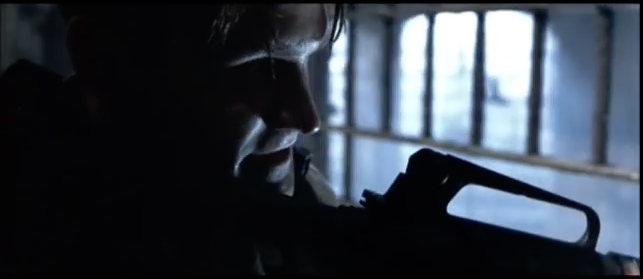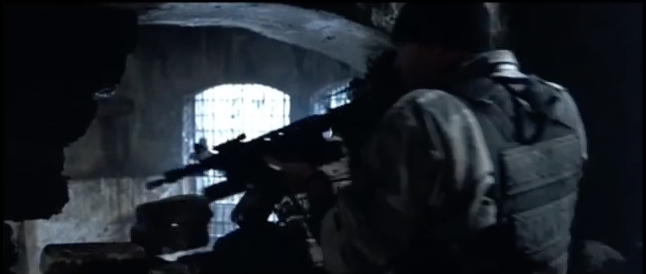Michael Bay’s “The Rock” is a movie that I hold very dear to my heart, perhaps his only movie that I have positive feelings for. My infatuation started with an amazing soundtrack by Nick Lennie-Smith, Harry Greyson-Williams and Hans Zimmer, and only grew with a few memorable scenes: the opening, the shower room massacre, the death of general Hummel. However, the sympathy did wane with subsequent viewings. Here’s why.
First, let’s watch the scene in question:
When I first saw the movie, I saw the tension building up, and the shootout that comes out of it as an accidental release, which no party really wanted. Somebody stumbled, and the rock that fell down resulted in a bloody outcome. Really, really tragic accident, that constituted a point of no return for General Hummel, but also showed how reluctant he was to play the role of the villain, and at the same time powerless against forces larger than himself. I loved it. It was a tragedy in the Greek sense of the word – showing the inexorable fate descending on the proud, angry men. It seemed almost like a mythical struggle.
The problem of course was, that during first viewing I totally missed this shot of captain Frye:
And the obvious pushing of the rocks in this shot:
When I finally noticed it during the second or third viewing, I became thoroughly disappointed. The great clash of forces, where nothing is black and white, and each side is right on some level, wrong on another, and at the same time respectful towards the opponent and loosing the battle to remain fully professional and in control, was reduced to them both being victims of “the true bad guys”. The hand of fate was replaced with a human hand, and thus the tragedy was reduced from its nearly mythical dimension to a mere whim of lowly motives of a few people, and essentially the general becoming a tool in the hands of the mercenaries.
Of course, there might be a lesson to be learned here as well, and another meaning might come up as well. It is also the very first moment in the movie when we see the premonition about two new captains being unproven, and thus unreliable, come to life, and where we can begin to see Frye for who he really is. He does get introduced here as the third player in this game, the real enemy.
Yet I could not shake the feeling (or hope), that perhaps at some point there indeed was a version which appealed more to my taste of grandiose. Out of curiosity, I took a look at the shooting script of the movie. And it turns out, the script is much less clear in this matter:
ON THE MEZZANINE
CPTS. FRYE, DARROW and PVTS. COX, MCCOY, have their weapons trained; they’re pumped and trigger happy.
…
BEHIND THE COLUMN – S.E.A.L. BOYER, just 20, having never seen combat, is trembling with fear, indecision.
S.E.A.L. BOYER
It’s us or them, Reigert, fuck they’re gonna waste us…
S.E.A.L. REIGERT
Get a grip on yourself…
ON THE MEZZANINE – PVT. COXIS BOOT nudges a TILE which has come loose from its mortar. The tile inches to the edge of the mezzanine. Then it falls……
BOYER, reacting to THE FALLING TILE, brings up his machine gun and fires A SUSTAINED BURST in its direction —
And all hell breaks loose. THE MARINES fire in unison. A cruel withering fusillade.
Private Coxis is one of Frye’s men. It’s not clear if he is doing it by accident, or on purpose. It’s his boot that is nudging the tile, not the private himself, so you can read into it anything you want. There have been many rewrites of the original script, so the original intention remains uncertain. Jonathan Hensleigh, the author of the final shooting version, worked with Bay on the movie closely, though, so the chances are, that he also thought Coxis did it intentionally… But it still leaves some wiggle room, and hope that the original idea was more than it later became.
To be fair, the exchange between Commander Anderson and General Hummel is much better and much more dramatic than in the script, showing the respect that each had for another, and Hummel’s hesitation without too much pompous words, and really escalating the tension. Perhaps I could cut Michael Bay some slack by assuming that he wanted to picture the Frye and Coxis as “trigger happy” the way he shot and edited this scene. But Coxis intention is too obvious, too clear on the repeated viewing, to be an accident. And since it immediately follows Frye’s “let’s waste the fuckers” line, the meaning is obvious: it’s not an accident. It’s a provocation. And that makes all the difference, reducing the magnitude of the tragedy. What a terrible waste.
To be honest, General Hummel was the only interesting personality in this movie. I did not care about neither Connery nor Cage very much. They were only tools to Hummel’s redemption, and their character arcs were totally bland and predictable (though well-acted). The Rock could have been so much better, if the main point of view was given to the mutineered officer. It could have been a real, deeply meaningful tragic story, for which I still am a great sucker. Such as it is, it’s only a decent action movie with great soundtrack and a few memorable scenes.





